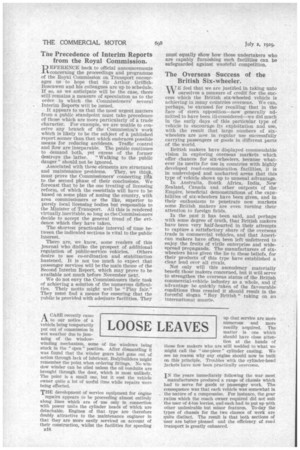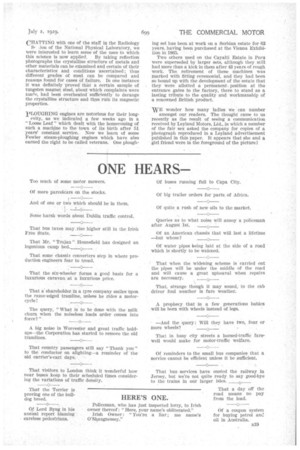A CASE recently came to our notice of a vehicle being
Page 44

Page 45

If you've noticed an error in this article please click here to report it so we can fix it.
temporarily put out of commission in wet weather due to jamming of the windowwinding mechanism, some of the windows being stuck in the " open " position. After dismantling it was found that the winder gears had gone out of action through lack of lubricant. Bodybuilders might remember the point when ordering fittings. No window winder can be oiled unless. the oil tonduits are brought through the door, which is most unlikely. The point is a small one, but it cost the vehicle owner quite a lot of useful time while repairs were being effected.
THE development of service equipment for engine
repairs appears to be proceeding almost entirely along lines which are of use only in connection with power units the cylinder heads of which are detachable. Engines of that type are therefore doubly attractive to the maintenance engineer in that they are more easily serviced on account of their construction, whilst the facilities for speeding up that service are more numerous and more readily acquired. The matter is one which should have close attention at the hands of those few makers who are still wedded to what we might call the " one-piece " cylinder casting. We see no reason why any engine should now be built on this principle. Troubles with the cylinder-head jackets have now been practically overcome.
IN the years immediately following the war most manufacturers produced a range of chassis which had to serve for goods or passenger work. The consequence was that each vehicle was somewhat in the nature of a compromise. For instance, the gear ratios which the coach owner required did not suit the user of 4-ton lorries, and each had to put up with other undesirable but minor features. To-day the types of chassis for the two classes of work are quite distinct. The result is that both sections of user are better pleased and the efficiency of road transport is greatly enhanced. CHATTING with one of the staff in the Radiology lion of the National Physical Laboratory, we were interested to learn some of the uses to which this science is now applied. By taking reflection photographs the crystalline structure of metals and other materials can be eXamined and certain of their characteristics and conditions ascertained ; thus different grades of steel can be compared and reasons found for cases Of failure. In one instance it was definitely proved that a certain sample of tungsten magnet steel, about which complaints were made, had been overheated sufficiently to derange the crystalline structure and thus ruin its magnetic properties.
1)LOUGHING engines are notorious for their long evity, as we indicated a few weeks ago in a "Loose Leaf" which dealt with the homecoming of such a machine to the town of its birth after 51 years' constant service. Now we learn of some Fowler steam-ploughing engines which have also earned the right to be called veterans. One plough big set has been at work on a Serbian estate for 63 years, having beeii purchased at the Vienna Exhibi tion in 1865. , Two others used on the Cayalti Estate in Peru were superseded by larger sets, although they still had more than a kick in them after 43 years of rough work. The retirement of these machines was marked with fitting ceremonial, and they had been so bound up with the development of the estate that they were allotted a permanent. position at the entrance gates to the factory, there to stand as a lasting tribute to the quality and workmanship of a renowned British product.
WE wonder how many Indies we can number amongst our readers. The thought came to us recently as the result of seeing a communication received by Leyland Motors, Ltd., in which a member of the fair sex asked the company for copies of a photograph reproduced in a Leyland advertisement published in this paper. It appears that she and a girl friend were in the foreground of the picture I




















































































































